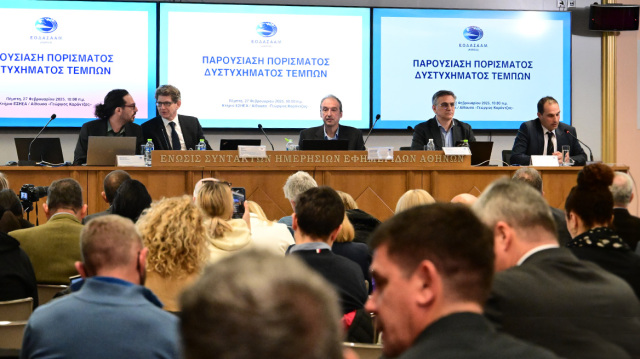The situation at EODASAM has escalated following Supreme Court prosecutor Georgia Adilini’s intervention yesterday. Deputy President Christos Papadimitriou has made serious allegations against European official Bart Akou and expert Kosta Lakafosis, and today, he has contradicted himself.
Today’s minutes from the Board of Directors meeting reveal that Papadimitriou informed the Board of a letter he received from Kosta Lakafosis. The letter states that Lakafosis received an email regarding his involvement with the University of Ghent’s research on the pyrosphere since late January. While Papadimitriou was not the primary recipient of this information, it was shared with him. Shockingly, today he claimed he had not seen the email.
Specifically, the meeting minutes note, “Mr. Papadimitriou acknowledges the existence of this particular email, which, due to his extensive correspondence and lack of engagement with the investigation, he did not open or read the attachments.” This raises questions about Papadimitriou’s understanding of the NDPO’s involvement in the Ghent investigation—an issue he should have been aware of weeks prior to the report’s release.
Moreover, during the same briefing, Papadimitriou further asserted that he does not view the Commission of Inquiry’s use of EDAPO as “illegal.” He suggested that alternative methods could have been used for the investigation, asserting that institutions like Democritus University might have been a more suitable choice.
“Nonsense” Regarding the Pyrosphere
The situation intensified concerning the controversial pyrosphere. In multiple media appearances yesterday, Papadimitriou reiterated his objections to Bart Akou regarding the reliability of conclusions drawn about the pyrosphere’s reaction to unknown fuel, reporting a weight of approximately 2.5 tonnes. He claimed Europeans “consider us Ugandan” and indicated they were biased against the theory that silicone oils may ignite, likely due to concerns over electric cars used in two-thirds of Europe’s trains.
Today, however, Papadimitriou backtracked, informing the media from EODASAM’s offices that the conclusion regarding the pyrosphere was being retracted for further investigation. “The EODASAM’s conclusion is a documentation and report on all errors that led to the crash, not an inquiry into the pyrosphere. The council supports this conclusion and commends the investigation team’s work, and stresses that the assessment regarding silicone oils’ non-involvement in pyrosphere formation is based on Professor Konstantopoulou’s testimony from Aristotle University of Thessaloniki,” the minutes emphasized. Essentially, EODASAM is reverting to the position that Papadimitriou had previously challenged.
Indeed, Papadimitriou indicated that the Board of EODASAM “in no way declares that the assessment included in the conclusion is incorrect, but as requested by the committee, this must be confirmed and certified immediately. Once that’s accomplished, the relevant part of the conclusion will be revised with fully certified results from leading academic institutions.”
A Significant Concern
Following today’s Board meeting, a major concern emerges for Papadimitriou, given his inconsistent statements regarding the investigation into the tragedy. At a time when distraught parents and the broader Greek society demand clear answers regarding the Tempi incident, he appears to be changing his position rapidly. A preliminary investigation by the public prosecutor’s office is currently underway to assess findings and any potential undue influence on judicial officials handling this case. Until now, the government had no plans to impose a “moratorium” on Papadimitriou to avoid interfering with the agency’s work, even as he communicated that he had no intention of resigning. However, it is evident that the Ministry of Infrastructure and Transport is feeling considerable embarrassment regarding recent developments.
Ask Me Anything
Explore Related Questions

















